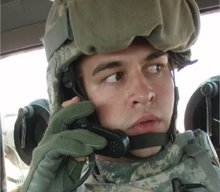Route Mobile is a modern 6-lane highway that connects Anbar province to Baghdad.It runs past Ramadi, Falluja, and many smaller towns along its path. The infamous Abu Gahraib detention facility lies on Mobile, just past Falluja. The stretch of road between Ramadi and Falluja is bland, the road gently curving north and south. The concrete is pockmarked here and there with past IED explosions, and every so often the remains of a destroyed vehicle are scattered across the desert landscape. This is the road I often take on my way from Ramadi to Falluja, and back again. My permanent home is still in Ramadi, capital of the Anbar province, but lately I've spent a lot of time patroling the streets of Falluja and along the canals of the surrounding farmland. The city bears clear witness to the terrific battle fought here two years ago between the worst of the Anbar insurgency and the gathered soldiers and Marines. Shell and bullet holes scar the walls, and there is still rubble in the streets. However, unlike Ramadi, Falluja seems to be a fairly functional city now. The streets crowd with people, shops are open for business, and new construction dots the landscape in stark contrast to the desolate war zone that defines Ramadi.
Today, my platoon wound back and forth among the canal-cut farmland just outside the city. If there is a place I have seen in Iraq that I would describe as "nice", this was it. The shallow river valley that we crisscrossed was green with growth, despite the desert landscape predominate in the area. One of the first buildings we came across as we began our patrol early this morning was a mosque that did double duty as a children's school. We paused for a moment as several young Iraqi children were dropped off by the "schoolbus"- a semi tractor with a cluster of small faces standing on the trailer hitch. The boys walked across the road and waved, while the girls shyed away from the trucks (one brave one paused to wave).
Most of the land is flood-irrigated crops of one sort or another. Shepherds move across the fields with the most docile flocks of sheep I have ever seen trailing them. Considering the importance Arabs place on family, I'm not suprised to see that farming is a family enterprise- most flocks of sheep or goats is accompanied by an older man or woman, along with several children. I tried to talk a little with an older man during a stop. My Arabic is somewhere between bad and terrible; I've spent a little bit of time working on the language, but the regional variation in dialects is almost as much of a handicap as my poor pronunciation.
As-salaam Alaykum -Peace be with you
Wa-alaykum Al-Salaam - and with you
In words I can (barely) say, but have no idea how to spell, I ask if he's seen any bombs.
He shrugs, and says something that sounds like inshallah - as Allah wills.
As the truck starts to move again, I call ma'a Salama - Goodbye
Translation: He either doesn't know of any bombs, or he won't say. On the other hand, he probably won't try to blow me up.
Not everything is peaceful here among the farmers- we find some IEDs. One is large; not the biggest we've found, by any means, but big enough. There's no way to tell if fighters from out of the area left them, or if one of the farmers means us harm.
As we head home, the sun is looming large over the horizon. The local mosque begins to sound the sunset ahdan, the call to prayer. The shepherds continue to watch their flocks, but off in the distance a woman spreads a mat on the ground and bows towards Mecca as the hypnotic chant floats through the air. I can only catch phrases here and there:
Allahu Akbar - God is great
Hayya 'alas-salat - Come to pray
La ilaha illallah - There is no god but Allah
As we leave the fertile farmland, the last thing I see is a farmer leaning up against a shovel. He watches us leave and doesn't move a muscle as we go, leaving the sun to set over the valley.
Before now poetry has taken notice
Of wars, and what are wars but politics
Transformed from chronic to acute and bloody?
from "Build Soil"
Robert Frost
Monday, December 11, 2006
Subscribe to:
Post Comments (Atom)

Very strong piece TD. I love the way your writing brings me into the post.
ReplyDeleteI just found you courtesy of Patterico. Thank you, and your peers, for your service.
ReplyDeleteThat last little vignette is a poetic description of the calm amidst the storm. I liked your touch... it was very pure. And I like to know what you see every day, even more through your eyes.
ReplyDeleteDo you remember when we used to write stories when we were little? You wrote one once that was flavored strongly with essence du Tom Swift... I think I teased you for the adventurous vernacular you chose. :D